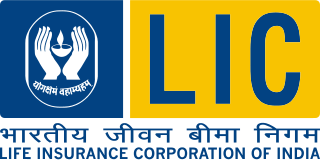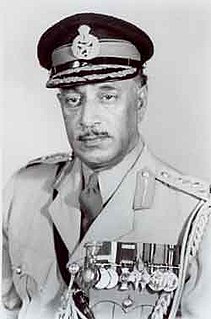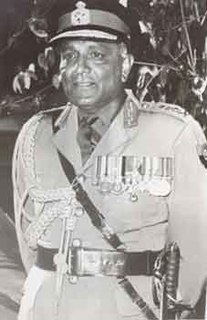Related Research Articles

The Indian Army is the land-based branch and the largest component of the Indian Armed Forces. The President of India is the Supreme Commander of the Indian Army, and its professional head is the Chief of Army Staff (COAS), who is a four-star general. Two officers have been conferred with the rank of field marshal, a five-star rank, which is a ceremonial position of great honour. The Indian Army originated from the armies of the East India Company, which eventually became the British Indian Army, and the armies of the princely states, which were merged into the national army after independence. The units and regiments of the Indian Army have diverse histories and have participated in a number of battles and campaigns around the world, earning many battle and theatre honours before and after Independence.

Adjutant is a military appointment given to an officer who assists the commanding officer with unit administration, mostly the management of human resources in an army unit. The term adjudant is used in French-speaking armed forces as a non-commissioned officer rank similar to a staff sergeant or warrant officer but is not equivalent to the role or appointment of an adjutant.

An adjutant general is a military chief administrative officer.

The Adjutant General's Corps is a corps in the British Army responsible for many of its general administrative services. As of 2002, the AGC had a staff of 7,000 people.

Life Insurance Corporation of India is an Indian state-owned insurance group and investment corporation owned by the Government of India.
The Life insurance Corporation of India was founded on September 1, 1956, when the Parliament of India passed the Life Insurance of India Act that nationalized the insurance industry in India. Over 245 insurance companies and provident societies were merged to create the state-owned Life Insurance Corporation of India.

Field Marshal Kodandera "Kipper" Madappa Cariappa, OBE was the first Indian Commander-in-Chief (C-in-C) of the Indian Army. He led Indian forces on the Western Front during the Indo-Pakistani War of 1947. He was appointed Commander-in-Chief of the Indian Army in 1949. He is one of only two Indian Army officers to hold the Five-star rank of Field Marshal; the other being Field Marshal Sam Manekshaw.
The Royal Air Forces Association is the largest single Service membership organisation and the longest standing registered service charity that provides welfare support to the RAF Family - providing friendship, help and support to current and former members of the Royal Air Force and their dependants.

General Kodendera Subayya Thimayya (1906-1965), DSO was a distinguished soldier of the Indian Army who served as Chief of Army Staff from 1957 to 1961 in the crucial years leading up to the conflict with China in 1962. Gen. Thimayya was the only Indian to command an Infantry brigade in battle during the Second World War and is regarded as the most distinguished combat officer the Indian Army has produced. After the Korean War, Thimayya headed a United Nations unit dealing with the repatriation of prisoners of war. After his retirement from the Army, he was appointed Commander of the United Nations Peace Keeping Force in Cyprus from July 1964 to December 1965 and died in Cyprus while on active duty on 18 December 1965.

General Jayanto Nath Chaudhuri, was a General Officer in the Indian Army. He served as the 6th Chief of Army Staff from 1962 to 1966 and the Military Governor of Hyderabad State from 1948 to 1949. After his retirement from the Indian Army, he served as the Indian High Commissioner to Canada from 19 July 1966 until August 1969.

The Ministry of Defence (MoD) is charged with coordinating and supervising all agencies and functions of the government relating directly to national security and the Indian armed forces. The President of India is the ceremonial commander-in-chief of the armed forces of the country. The Ministry of Defence provides policy framework and resources to the armed forces to discharge their responsibility in the context of the defence of the country. The Indian Armed Forces and Indian Coast Guard under the Ministry of Defence are primarily responsible for ensuring the territorial integrity of India.

General Paramasiva Prabhakar Kumaramangalam, was the 6th Chief of the Army Staff (COAS) of the Indian Army from 1967 to 1969. He was among the last of the King's Commissioned Indian Officers trained in England in the Indian Army, and the last KCIO Indian Army Chief.
The Ministry of Agriculture and Farmers' Welfare, a branch of the Government of India, is the apex body for formulation and administration of the rules and regulations and laws related to agriculture in India. The three broad areas of scope for the Ministry are agriculture, food processing and co-operation. The agriculture ministry is headed by Minister of Agriculture Narendra Singh Tomar. Abhishek Singh Chauhan, Krishna Raj and Parsottambhai Rupala are the Ministers of State. Sharad Pawar, serving from 22 May 2004 to 26 May 2014, has held the office of Minister of Agriculture for the longest continuous period till date.

Corruption in India is an issue which affects the economy of central, state and local government agencies in many ways. Not only has it held the economy back from reaching new heights, but rampant corruption has stunted the country's development. A study conducted by Transparency International in 2005 recorded that more than 62% of Indians had at some point or another paid a bribe to a public official to get a job done. In 2008, another report showed that about 50% of Indians had first hand experience of paying bribes or using contacts to get services performed by public offices, however, in 2019 their Corruption Perceptions Index ranked the country 80th place out of 180, reflecting steady decline in perception of corruption among people.

The Ministry of Shipping, a branch of the Government of India, is the apex body for formulation and administration of the rules and regulations and laws relating to shipping, headed by Shri Mansukh L. Mandaviya.

General Satyawant Mallanna Shrinagesh was an Indian military officer who served as 3rd Chief of Army Staff of the Indian Army from 14 May 1955 till 7 May 1957. After retirement he served as the Governor of Assam from 14 October 1959 to 12 November 1960 and again from 13 January 1961 to 7 September 1962. He was the Governor of Andhra Pradesh from 8 September 1962 to 4 May 1964 and Governor of Mysore from 4 May 1964 to 2 April 1965. He also served as principal of the Administrative Staff College of India in Hyderabad, Hyderabad State from 1957 to 1959.
The Armed Forces of India are eligible for a myriad of military decorations. Decorations are awarded for extraordinary bravery and courage, as well as distinguished service during times of war and peace. Service and campaign medals have been awarded throughout the history of India as an independent state.
Department of Ex-servicemen Welfare( Poorva Senani Kalyan Vibhag) is a department, in Ministry of Defence, India. It was set up in 2004. The head of Department of Ex-servicemen Welfare since its inception has been a bureaucrat from the IAS. Veteran have for long demanded that DEWS be headed by a serving officers or a retired officer, like in other countries, including the United States, in which the Department of Veterans, is invariably headed by veteran with active duty military experience, with a cabinet rank. For instance the current head of the department is graduate of West Point, and has served in the army.

Fort Colville was a U. S. Army post in the Washington Territory located three miles (4.8 km) north of current Colville, Washington. During its existence from 1859-1882, it was called "Harney's Depot" and "Colville Depot" during the first two years, and finally "Fort Colville". Brigadier General William S. Harney, commander of the Department of Oregon, opened up the district north of the Snake River to settlers in 1858 and ordered Brevet Major Pinkney Lugenbeel, 9th Infantry Regiment to establish a military post to restrain the Indians lately hostile to the U. S. Army's Northwest Division and to protect miners who flooded into the area after first reports of gold in the area appeared in Western Washington newspapers in July 1855.

Voluntary Health Services, popularly known as the VHS Hospital, is a multispecialty tertiary care referral hospital in the south Indian state of Tamil Nadu, reportedly serving the economically weaker sections of the society. It was founded in 1958 by Krishnaswami Srinivas Sanjivi, an Indian physician, social worker and a winner of Padma Shri and Padma Bhushan awards and is run by a charitable non governmental organization of the same name. The hospital is situated along Rajiv Gandhi Salai at Taramani, in Chennai.

General Manoj Mukund Naravane PVSM, AVSM, SM, VSM, ADC is a Four Star general of the Indian Army and the 28th Chief of the Army Staff (COAS). He took over from General Bipin Rawat on 31 December 2019 after the latter completed his term as the COAS. Prior to his appointment as the COAS, the general served as the 40th Vice Chief of Army Staff (VCOAS) of the Indian Army, General Officer Commanding-in-Chief (GOC-in-C) of Eastern Command and General Officer Commanding-in-Chief of Army Training Command.
References
- ↑ "Army Welfare Housing Organisation – Plans and Projects". TheTeamwork.com. Retrieved 2 December 2014.
- ↑ "Indian Army Directorates Branches". Indian Army. Retrieved 2 December 2014.
- ↑ "Army Welfare Housing ... vs Adjutant Generals Branch & Ors on 4 September, 2013". Indian Kanoon. Retrieved 2 December 2014.
- ↑ "Irregularities unearthed in army housing project". Deccan Herald. Retrieved 7 December 2014.
- ↑ "Important Information: Demand Surveys" (PDF). Army Welfare Housing Organisation News Letter (April 2014): 15. Archived from the original (PDF) on 14 March 2015. Retrieved 7 December 2014.